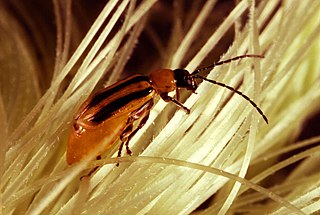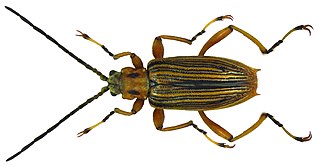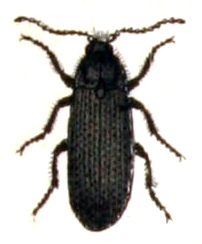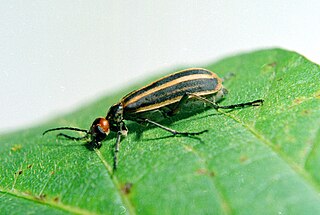Related Research Articles

Dynastes tityus, the eastern Hercules beetle, is a species of rhinoceros beetle that lives in the Eastern United States. The adult's elytra are green, gray or tan, with black markings, and the whole animal, including the male's horns, may reach 60 mm (2.4 in) in length. The grubs feed on decaying wood from various trees.

Diabrotica is a widespread genus of beetles, sometimes referred to as cucumber beetles or corn rootworms, in the family Chrysomelidae. Members of this genus include several destructive agricultural pest species.

Chilocorus stigma, commonly known as the twice-stabbed ladybug, is a native resident of the United States and Canada but does not live west of the Sierra Nevada.. It also has been introduced to Hawaii. It is shiny black, and there is one red spot on each elytron. The remainder of the body is black as well, but the abdomen is either yellow or red. It is sometimes confused with the "two-stabbed lady beetle", Chilocorus orbus, which is widespread in California.

The spotted cucumber beetle or southern corn rootworm is a species of cucumber beetle that is native to North America. The species can be a major agricultural pest insect in North America. Spotted cucumber beetles cause damage to crops in the larval and adult stages of their life cycle. Larvae feed on the roots of the emerging plants, which causes the most damage since the young plants are more vulnerable.. In the adult stage the beetles cause damage by eating the flowers, leafs, stems, and fruits of the plant The beetles can also spread diseases such as bacterial wilt and mosaic virus.

The Mexican bean beetle, Epilachna varivestis, is a species of lady beetle that can be an agricultural pest. It is one of the few North American lady beetles that feed on plants rather than other insects. It is found throughout Mexico and the eastern United States, and is abundant in the wetter and more heavily irrigated areas west of the Rocky Mountains. It does not tolerate extremely dry areas.
Stenelmis gammoni is a species of beetles in the riffle beetle family, Elmidae. It is known by the common name Gammon's riffle beetle.

Hoangus venustus, commonly known as the flax ladybird, is a species of ladybird beetle that is native to New Zealand, being found at least in the North Island. It can be found on New Zealand flax (Phormium) and Toetoe, reportedly eating the mealybugs that live there. Previously known as Cassiculus venustus, the valid name of the species is now Hoangus venustus.

Rodolia cardinalis is a species of ladybird beetle that is sometimes described as endemic to Australia.

Vibidia duodecimguttata is a species of ladybird beetle belonging to the family Coccinellidae, subfamily Coccinellinae.

Lycus trabeatus, common name tailed net-winged beetle, is a species of beetle in the Lycidae family, which is native to the eastern, southern Afrotropics and Arabian Peninsula. They are diurnal, aposematic insects. Adults feed on various flowers and their nectar, while larvae live under tree bark, in dead wood, or in detritus where they may live on fungi.
Dorcadion pusillum is a species of longhorn beetle of the subfamily Lamiinae.

Macroplea appendiculata is a species of leaf beetle of the subfamily Donaciinae which can be found in Northern and Central Europe.
Donacia malinovskyi is a species of leaf beetle of the subfamily Donaciinae.

Donacia clavipes is a species of leaf beetles from the subfamily of Donaciinae.

Melanotus punctolineatus, commonly known as the sandwich click beetle, is a species of beetle from the family Elateridae and the genus Melanotus.

Agonum lugens is a species of ground beetle in the Platyninae subfamily. It was described by Caspar Erasmus Duftschmid in 1812.

Eriopis connexa is a widespread species of ladybird beetle in South America.

Epicauta vittata is a species of beetle in the family Meloidae, the blister beetles. It is native to eastern North America, including eastern Canada and the eastern United States. It is known commonly as the striped blister beetle and the old-fashioned potato beetle. It is known as an agricultural pest.

Pogonocherus hispidulus, the greater thorn-tipped longhorn beetle, is a species of flat-faced longhorns beetle in the family Cerambycidae.
Omophron americanum, the American round sand beetle, is a species of ground beetle in the family Carabidae. It is found in, as well as native to, North America, ranging across most of the United States and Canada, except British Columbia.
References
| This Lebiinae-related article is a stub. You can help Wikipedia by expanding it. |